The Checker Maven
The World's Most Widely Read Checkers and Draughts Publication
Bob Newell, Editor-in-Chief
Published every Saturday morning in Honolulu, Hawai`i
Noticing missing images? An explanation is here.
A February Short

Even though this is a leap year, February remains as always the shortest month of the year. It's something to be grateful for in wintry North American climes, as this abbreviated month brings us that much closer to spring.
Today's problem is also "short" in that it is a miniature, those minimalist problems that focus our attention and often demand great accuracy and skill. Like their exact opposites, the stroke problem, they are not to everyone's taste, but unlike stroke problems, miniatures are eminently practical in nature.
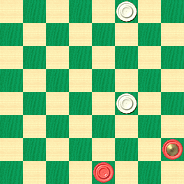
BLACK
Black to Play and Win
B:W30,14:BK5,2.
Don't give this problem short shrift; put it on your short list. After you've solved it, make a short click on Read More to see the solution.![]()
Pretty Tough

As we've noted a number of times, The Checker Maven tries to provide a variety of problems: some easy, some hard, some in-between. Today's problem, a study by celebrated problemist L. T. de Bearn, is, like the cut of meat shown above, definitely on the "tough" side. While obviously appealing to the skilled player looking for a challenge, intermediate players and even ambitious beginning players can benefit by doing some analysis and carefully playing through the solution.
So, without further ado, here's the position.
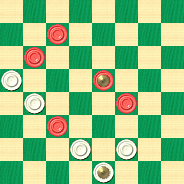
WHITE
White to Play and Draw
W:W13,17,26,27,K31:B6,9,K15,19,22.
Forces are even but White has a pretty serious mobility issue, and in checkers that can spell doom. But there is a way to a draw. Are you tough enough to find it, or will this problem chew you up? Get your teeth into this one, and then bite your mouse down on Read More to see the solution.![]()
The Speed of Winter

In continental North America, it seems that one day we're at a picnic and the next day we're buried in snow. Winter can come on fast and catch us by surprise; winter seems to have its own chilling speed.
It will be January when this column appears and no doubt there will be more than enough snow to go around in many locales. But wherever you may be, whether snowy and cold or warm and sunny (we highly recommend Hawai`i in January), you're sure to enjoy a checkers speed problem that is easier than most. Click on the link below to display the problem and start the clock. We think you can solve this one in five seconds, so that's all you're going to get! When you've got the answer, click on Read More to verify your solution.
January Speed Problem (Easy, five seconds)
![]()
New Year's Eve Spectacular

As this column is published, it's the last day of the year, New Year's Eve, and a lot of spectacular celebrations will be held throughout the world. Here in Honolulu (which due to its westerly latitude is the last major city on earth to ring in the New Year) parties abound. The photo above shows fireworks above the landmark Aloha Tower, where in 2010 a giant block party took place with seven stages, 20 DJs, and an incredible lineup of entertainment, with tickets available for as little as 15 dollars.
And believe it or not, we've found a checker problem that we think matches last year's Aloha Tower party for spectacularity--- and it won't cost you 15 dollars, or anything at all, to try it. Here's the position.
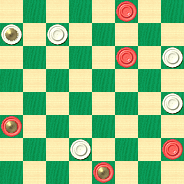
WHITE
White to Play and Draw
W:W26,20,12,6,K5:BK31,28,K21,11,3.
When originally published, the proposer stated that it might be difficult to solve without moving the pieces; yet we, like he, recommend that you try it. We'll give you a hint: it's spectacular in a certain subtle way rather than being pure fireworks, but we bet that in any event the solution will surprise you. Clicking on Read More will bring the solution to center stage.![]()
Happy Holidays

Happy holidays to one and all from The Checker Maven. We hope this holiday season will be everything you might ever wish it to be.
The holiday season here in Honolulu is bustling; it's one of the busiest times of the year for tourism, and airfares and hotel prices reflect this. If you're thinking of visiting Hawai`i some day (and we hope you are), but you'd like to do so on a budget, we definitely recommend September or October as a much more economical choice of seasons.
Whether your holidays are bustling, laid-back, or somewhere in between, we know you'll enjoy a fine checker problem to add to your festivities. You might want to settle in front of a crackling fire with a hot drink, in some climates; in others you might take the diagram to the beach with you and study it while catching some sun. However you do it, we know our selection of a Tom Wiswell problem is bound to please, even if it's more than a little on the challenging side.
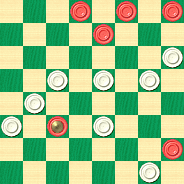
WHITE
White to Play and Win
W:W12,14,15,16,17,21,23,32:B2,3,4,7,K22,28.
So, what's the big deal, you might ask, White is two pieces ahead and should win easily. But all is not so simple. There's a big Black king in the middle of the White forces, and White is going to have to work for this one. Mr. Wiswell tells us that White will have to make no less than five "star" moves to bring home the victory.
Can you give the White forces a holiday present, or will they have to go without? Don't give up too soon; this one is well worth your time. When you've got your solution in hand, click on Read More to check your results.![]()
The Old Checkerist
We often celebrate Checker Maven publication anniversaries with an original work of checker fiction. For our seventh anniversary, we're proud to present a new short story called "The Old Checkerist." It's somewhat on the long side at about 4,800 words, so if you haven't got the time or the inclination to read it all, you can just skip down (way down) to the diagram and try to solve the problem (it's not easy). Of course, we do hope you'll read and hopefully enjoy the story.

One
He awoke just after dawn to the sound of the chickens in the neighbor's yard, a warm damp breeze carrying the sounds through his tattered screen window, along with the promise of another suffocatingly hot Mississippi day.
He wanted to just lay in bed and sleep away the day, or as much of it as he could. But it was impossible. He was already sweating, laying atop his sheets, knowing that growing discomfort would keep the much-wanted oblivion of sleep away from him. And so, with a mutter and a curse, he arose, grabbed hold of an old shirt, and pulled it over his head as he made his way to the tiny kitchen to boil some water and seek out a clean cup in which to brew some instant coffee.
It was about six in the morning. No use heading out to the park at the town square until at least ten; there wouldn't be much of anyone there before then. Maybe he could wash up, shave, clean up the place a little.
He knew he wouldn't. He would end up, as always, spending the time in front of the television, or, if he was really in a good mood, reading a copy of yesterday's newspaper that he had brought back from the park. The television usually won out.
He was getting old. No, he already was old, somewhere past seventy; he didn't really keep track any longer, and he didn't really care about it.
On days when it didn't rain, he played checkers in the little park in the town square. Five bucks a game; it wasn't exactly legal, but everybody knew about it and the sheriff looked the other way. He almost always won, some days bringing in as much as thirty dollars, giving him a little something to live on besides his Social Security. The town people didn't play him all that often, as they knew that losing their money was all but a foregone conclusion. Still, once in a while someone, usually after a couple of beers, would get an idea that they might beat the old man and they'd go down to the park and risk a few games. They nearly always came home empty-handed.
But they'd make sure to steer the tourists and passers-by his way. You ought to go down and play checkers with old Ned, they'd suggest, five bucks and you can say you played the best, the former honest to goodness Mississippi state cham-peen. It was an easy sell, and the tourists didn't even mind walking away ten or fifteen bucks lighter in the wallet.
Ned would sit for hours in front of his scuffed old board, looking at the just-as-scuffed old red and white wooden checkers, waiting for a game, lost in his own thoughts, getting up only to visit the restroom or drink from the water fountain. It was what passed for his life these days.
When it rained too much or it was on the cold side and no one would be out, old Ned had to stay home, keeping his own company. He thought about trying to get people to come and play at his cottage but in the end he decided he didn't want visitors dropping in any time they felt like it. So he just moped around the cottage, watching more television or trying to sleep.

Two
This morning, at least, looked like a nice one, and when noon rolled around Ned was on his way to the town square, board and checkers in hand, reading to take his seat at the stone tables in front of the War Memorial monument. His legs hurt a little more than usual--- arthritis, nothing really to be done about it, the doc would say--- and it took a little longer than usual for him to arrive and get settled in.
Jack Henderson, the insurance agent, turned up after fifteen minutes or so. Jack, somewhere in his mid forties, was an avid checker player but knew better than to risk his cash with Nick. But he'd come over to the town square from his nearby office sometimes during lunch hour and eat his sandwich while talking checkers with Nick. Nick enjoyed his company--- something he couldn't say about very many others--- and knew that Jack would quickly move aside if a paying customer came along.
Today was Monday and Jack was all abuzz about the big tournament that had taken place in nearby Natchez over the weekend.
"Quite the contest," he was saying. "A couple of Yankees from up there in New York showed up and thought they were pretty hot merchandise. Well, our boys gave 'em a pretty good lickin', leastwise all but one of 'em. That fella Ryman was one tough character, and he finished first. 'Course, Clayman is still State Champ on account of the Champ can't be no New Yorker. But Ryman finished Clayman off in the last round. It was a sad sight, but you gotta admit, Ryman is darn good."
Ned made a sound as if clearing his throat. "Hah. I should of been there. It'd been a little different story. Ain't no Yankee gonna win off me."
"Aw, c'mon Ned, you know you ain't played a tournament since you retired back in '49. You're good, you're dang good, but you ain't no match for the likes a Ryman, 'least not no more you ain't."
Everyone knew that Ned was a pretty grumpy old guy, and generally kind of irritable, but he seldom got made, least of all at his friend Jack. But Jack had perhaps gone a little too far, and the fire was building in Ned's eyes.
"I retired 'cause a my arthritis and you know it!" he growled at Jack. "That don't mean some dang Yankee that can beat Clayman could beat me! And I don't need your fool opinion if that's what you think!"
"Whoa, whoa there, Ned!" replied Jack. "No need to fly off the handle! Just hold your horses and let me tell you the rest a the story."
Jack settled down a little but still didn't look to pleased. "Well, go on then," he grumbled.
"Well then," Jack went on, "seems like this Ryman heard a you and was askin' around like he was hopin' to find you at the tournament. 'Course, the guys, they told him that you don't play tournaments no more an' that it ain't so easy for you to get around. So they was sayin' as how you lived down here an' played a few games in the square..."
"So what?" Ned interrupted. "What, did this Yankee think I'd go up to Natchez just to play him a couple a games? What does he think, he's some kind a movie star?"
"No, no, Ned," Jack replied. "He said as how he might come down here hisself!"

Three
Jack had to get back to the office and left Ned sitting and stewing in his seat at the bench. Ned knew about Ryman, of course; everyone who knew anything about checkers did. Ryman wasn't originally a New Yorker but it hadn't taken him long to develop a New Yorker's ego and sense of superiority. He was brash and bold, but for better or worse, he was really good.
But all of this left Ned wondering. An afternoon breeze carried off the worst of the humidity as Ned continued to stew. It looked like no one was going to show up to play today, but he'd sit there until four or five in the afternoon. There was little else to do in any case.
The big tournament had finished yesterday. Most of the players would have gone home last night, or at the latest, this morning. The out-of-state players would be on an early train heading to various other Southern cities, or in Ryman's case, probably back to New York. Why would he spend another day--- probably two, when you considered the extra travel time--- to come down to this little town? He was just blowing smoke, just talk. And why would he bother with an old man who even his friends, like Jack, thought was past his prime? It didn't add up.
Besides all of that, Ned didn't want to admit to himself that the idea of Ryman really showing up was a little frightening, despite the way he had reacted when Jack told him that Ryman was too tough for him. Ned and Clayman had always been pretty close when Ned was Champ and Clayman was an up-and-comer. Clayman was in his prime right now, and if Ryman was able to beat him, he must be every bit as good as the checker magazines said he was. They were saying that he'd be World Champ in a few years, that he'd take on Longge pretty soon and have a real chance at the biggest checker crown of them all.
But it didn't really matter. He would likely never meet Ryman in any case.
Before Ned knew it, it was six o'clock and the Plaza was empty. Everyone had already gone home. Perhaps he had dozed off a little; the afternoon seemed to have passed quickly, and as expected no one had come along to offer him a game. With a sigh Ned rose, packed up his board and pieces, and started his slow walk back to his cottage.

Four
Tuesday morning started off pretty much the same as Monday, or any other day for that matter. The same chickens clucking, the same stiffness, the same heavy humidity. Ned was in his kitchen. It was about seven in the morning and he was halfway through his first cup of coffee when he heard an insistent knocking at the front door.
He got up out of his chair and walked to the front of the cottage. Hardly anyone ever came here any longer. Who could it possibly be, and at this hour of the morning? He threw the door open. It was Jack. Before Ned could speak, Jack was already saying, "Ned, Ned, come quick! Come right away!"
"Come where? What in the dickens are you talking about?" Ned growled, obviously not very pleased to see his friend. His coffee would be getting cold out in the kitchen.
"To the Plaza! Come on, he's here, he's looking for you! He just got off the early train!"
"Just hold on, Jack! It's seven thirty in the mornin', I'm still drinkin' my coffee, and you're tellin' me to run to the Plaza for what?"
But then he paused, as if frozen in place. Suddenly, he knew who was there, he knew who was looking for him.
Jack saw the look on Ned's face. "Yep, Ned, it's Ryman. He's waitin' in the Plaza for you to come down there and play a little match with him."
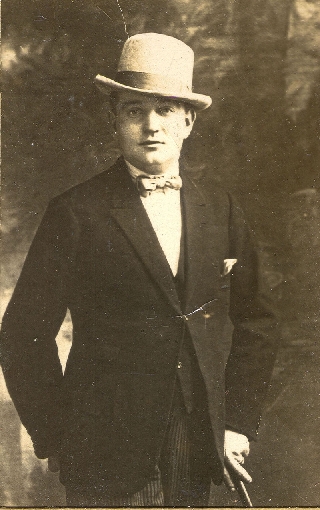
Five
It took Ned a little while to get going. Was he starting to have doubts about all this? Could his hands be trembling as he buttoned up his shirt in his room, while Jack waited impatiently outside?
Well, there wasn't much choice, was there? If he didn't show, even if he made up an excuse such as illness, it would be a huge insult to Ryman, and Ryman would make sure it got into the checker magazines. "Ex Mississippi champ won't play Ryman" the story would read, and his checker legacy would be one of cowardice instead of that of a champion.
Finally he was ready to go. They went in Jack's car, to save time Jack said, even though Ned made an effort to say he would walk instead.
Jack pulled into his parking place in front of his insurance office at the side of the Plaza. Ned got out of the car. It wasn't hard to miss Ryman, pacing around the grassed area at the center of the Plaza, smoking a cigarette, wearing his trademark cheap suit, worn to a shine from years of travel from tournament to tournament, eking out the impossibly narrow living of a professional checkerist. Without a word, Ned walked over to the stone table and began to set up his board and pieces.
Ryman saw him at once, of course, and hurried over, extending his hand for a weak and sweaty handshake. "Of course you're old Ned!" he exclaimed. "Couldn't hardly be anyone else!"
"Yes, I'm Ned," Ned replied, leaving out the "old" adjective. "And you're surely young Ryman."
"Indeed, indeed, one and the same, the one and only Will Ryman, next checker Champion of the world!"
"Modest fella, ain't you?" Ned said. "So what brings you to our little town? Would have thought you'd a been on your way back to New York by now."
"Wouldn't miss a chance to challenge old Ned to a match, now, would I? Just a little train ride down here from Natchez, anyways, and I figure on winning back my train fare ... no offense, you know, but you haven't played for a little while ... still, I figure it an honor to meet an old-time champion and play a few games, even if I do win them."
Ned knew about Ryman's brashness and ego, but this was getting to be a little too much. Meanwhile, a bit of a small crowd was starting to gather. Not a whole lot went on in the little village, and Ryman's arrival promised a little excitement even for people who didn't know anything about checkers.
"Well, then, Mr. Ryman, exactly what did you have in mind?" Ned asked calmly, though he was anything but calm by this time.
"A little stakes match," Ryman said.
"Just how little?"
"A hundred dollars, and it goes to the first player to win two games."
A hundred dollars! Ned seldom made that much in a couple of weeks of playing checkers, and it was a good chunk of his Social Security check. It was a stake he couldn't afford to lose.
"That's quite an amount, Mr. Ryman," Ned said. "It's more than the prize money you took at the Natchez tournament this past weekend. You must be feeling pretty confident."
"Well, Old Ned, if you're not so confident, and I guess you have got some reason to be doubtful, given who you'll be playing and all that, we could say maybe fifty instead?"
Ned had had enough, but fifty dollars sounded more reasonable despite the insult. "Listen here, you young Yankee, put up that fifty bucks and let's get going!"
There was a little more banter back and forth, but finally the terms were set. A member of the local checker club who was standing by would be the referee. The standard five minutes per move rule would apply. The full stake would go to the first player to win two games. Ryman, as the visitor, would play Black in the first game and colors would alternate each game thereafter. There would be a one hour lunch break at noon, and if a winner had not been declared by five o'clock in the afternoon, the match would go to the player with the highest current score. In case of an even score the match would be declared a draw.
Ned and Ryman shook hands and play began in the growing heat of the Mississippi morning.

Six
They felt each other out for the first few games, neither player taking much in the way of risks. Finally around ten o'clock, Ryman pulled one of his "horseradish" moves, but Ned was on to it. Still, Ryman recovered and the game ended in a draw. Lunchtime came along and neither player had yet scored a win.
Ned was feeling pretty tired as he went with Jack to Jack's office to get inside for a while and eat of couple of the sandwiches that Jack brought over from the cafe down the street.
"You look a bit peaked, Ned," Jack said as he chewed on a ham and cheese, his feet up on the large walnut desk which filled up a good part of his little office.
"Now, Jack, you ain't gonna start that 'Old Ned' business, I hope," Ned said.
"No, no, but I ...."
"Sure, I'm tired. But I'm holdin' my own out there."
"Ned, can't you see what he's doin'? He's just wearin' you down, waitin' for you to slip up. He's younger and he can stand it longer, and he knows it. You know it too. You gotta start mixin' it up a little more ..."
"I know how to play, Jack, and that includes knowin' how to play against impertinent Yankees!"
But the truth was that Ned really didn't know what to do. Jack was right. Ryman would wear him down, playing draw after draw until Ned was just too tired and made a mistake. And then Ryman would win. Ned would have to try something different. What could it be?
Ned had stopped talking, and Jack, realizing that his friend wanted to rest for the remainder of the lunch hour, didn't say much more either.
A little later, Jack shook Ned gently. "Time to go back, my friend," Jack said. Nick awoke from a light, troubled slumber, and the two of them made their way back out to the stone table in the middle of the Plaza.
Seven
About an hour later, after another drawn game, Ned got a break. The play wandered into a sharp and tricky line of play. Ned hung on and then Ryman got flustered, taking himself off into a losing variant. Ned brought home the win.
But Ryman was a professional and refused to be rattled. The win had cost Ned a lot of precious energy, and two games later Ryman evened the score when Nick made a blunder.
Another couple of draws followed, Nick hanging on as best he could. It was now well after four o'clock. The referee announced that there was time for just one more game, which would start after a five minute break.
Nick was exhausted. He was dizzy and sweating, and there was a sharp pain in his chest. But he just had to hang on for one more game. He wanted a win and wanted to take the match, but if he could get a draw, the match would be a tie and at least he wouldn't lose his money.
The worst of the heat of the day had evaporated. That was a blessing, but the afternoon breezes had died down and the day was drawing to a close in the shadowy stillness of late afternoon. Ned mopped perspiration from his face and neck with his handkerchief and took a long drink from the water fountain. It hurt so much in his chest as he walked back to the stone table and sat down to the final game. Ryman was looking as fresh as he had in the morning, his suit still neat, his collar buttoned, and his tie nicely knotted.
The crowd of onlookers, which had waned during working hours, had built up again as the working day came to an end. Word had spread that Ned was holding out against Ryman and that it was all down to a final game. Could Ned hold out? Did he have any tricks left up his sleeve? Would Ryman's obvious strategy of wearing the older player down result in a last-minute victory?
One thing they all agreed on. Ned didn't look very well. His friend Jack even went up to him and asked if he really would be able to finish the match, but Ned waved him away angrily, his face flushing even redder. Yet, despite all the water he drank, he couldn't stop sweating. His shirt was soaked at the underarms and even his hands were wet. And the pain wouldn't stop.
He had to set all of that aside. It was time for the final game to begin.
Eight
Ned had the White pieces this time, not that it made a lot of difference. Ryman, all smiles and confidence, looked Ned straight in the eye and played 12-16.
That caught Ned by surprise, and the shock of it was almost visible on his face. Ryman almost always played 11-15, widely considered by experts to be the strongest opening move. 12-16, which was called "The Dundee" was near the bottom of the list. Had Ryman being saving up one of his tricky "horseradish" lines for the critical game of the match?
Well, Ned thought, I've played the Dundee before. Nothing to worry about, and I know a trick or two. He played the unusual reply 21-17, trying to steer the game into a direction that would avoid Ryman's "horseradish." Ned attempted to stare back at Ryman, but the pain in his left side was too much and he couldn't quite manage more than an extended glance. Ryman quickly played 9-13. It was the "Dundee Switcher" and Ned was on familiar ground. Perhaps, he hoped, Ryman was not.
| 1. | 12-16 | 21-17 |
| 2. | 9-13 |
Each player made a few more moves, the balance of the game seeming to stay even. The spectators started to mutter to each other about maybe the match ending in a draw after all.
Then Ned played 30-25 and suddenly everyone was paying attention. It was an unfamiliar move. Was Ned trying a bit of his own "horseradish" on Ryman? For his part, Ryman sat back on the stone bench, folded his arms, and frowned wordlessly.
| 2. | ... | 24-20 |
| 3. | 11-15 | 20x11 |
| 4. | 7x16 | 25-21 |
| 5. | 5-9 | 30-25 |
Another few moves went by, and then Ryman played 8-11. The move looked natural enough, but Ned's mind started spinning. Ryman's move just didn't seem right.
| 6. | 9-14 | 27-24 |
| 7. | 16-20 | 24-19 |
| 8. | 15x24 | 28x19 |
| 9. | 8-11 |
Ned was sweating and pain was traveling up and down his left arm. He forced himself to take a few deep breaths, exhale slowly, and then just sit for a few moments trying to clear his mind. He knew the Dundee, surely knew it as well as anyone else, including probably Ryman. That meant that any move that was pretty far from book play was likely to be unsound. But if Ryman was playing it, the move would also be full of tricks and hard to figure out in a hurry. Ryman, of course, had likely put in hours of preparation at home, and would be ready to pounce on any mistake that Ned might make.
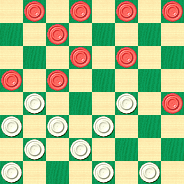
WHITE
White to Play and Win
W:W32,31,29,26,25,23,22,21,19,17:B20,14,13,11,10,6,4,3,2,1.
Ned kept trying to breathe regularly and block out the pain. His chest was starting to feel tight, but he focused now on the board and on finding the right move. He knew that one slip and it would all be over.
Suddenly he saw through it. There were two moves that Ned could make. The one that looked most likely wouldn't work. But the other move, that was the one.
Ned was pulled out of his thoughts by the sound of the referee calling "Time!" This meant that Ned had just one more minute to make his move, or he would forfeit the game. He reached out his right hand hesitantly. It shook as he extended it over the board. Surely Ryman would notice; he knew how to play the opponent as well as the board.
Ned took another breath and made the move, then dropped his clammy right hand to his lap and sat back, waiting.
For the conclusion to the story and the answer to the problem, click on Read More.![]()
Thanksgiving 2011

We've come again to the Thanksgiving season, that great American holiday which we enjoy so much. It's a great time for family, food, and celebration; a time to reflect on the many good things that we enjoy each and every year.
At Thanksgiving we like to feature a problem from a leading American problemist. This year, we turn to Ben Boland, whose work is often featured in our columns. Today's study isn't easy (most of Mr. Boland's problems definitely present a challenge) but solving it, or making a good effort, will earn you the traditional coffee and pie that will round out your day in an excellent fashion.
Here's the problem:
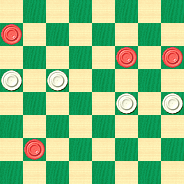
WHITE
White to Play and Draw
W:W20,19,14,13:B25,12,11,5.
When the problem was originally published, we were told "you will be well repaid for your efforts should you solve it--- without looking at the solution." We too admonish you: "Don't peek!" It's a fine problem and well worth your time.

When you've given this a good effort--- and not before!--- click on Read More to see the solution.![]()
Fall Blows in Fast

North America is well into the autumn season, and what's left of the leaves on much of the continent is blowing away fast. Winter is just around the corner in most northern locales; there isn't much time left.
We hope that today's speed problem won't blow you away, but you'll have to act quickly as indeed there isn't much time. We think 15 seconds is more than enough for a problem that merits a difficulty rating of "moderate" at most. We'll warn you: there are actually two winning paths; one is much longer than the other.
Don't get frozen out; click below to display the problem and start the clock. Then come back and click on Read More to verify your solution.
November Speed Problem (moderate difficulty; 15 seconds)
![]()
Ballroom Dancing

Gaby Lopez CC0
Marvin J. Mavin had seemingly mended his errant ways, and had returned to the captaincy of the Detroit Doublejumpers in the National Checker League. (In a previous column we related how Marvin had been sent down to a single-A farm club after showing disrespect to his manager.)

Marvin J. Mavin
Today, the Doublejumpers were in Miami for an exhibition match with one of Florida's top amateur teams, the Dancing Draughtsmen. Sponsored by the National Ballroom Dance Federation (NBDF), the Dancing Draughtsmen were captained by none other than NBDF President Vincent "Vinnie" Boggler. Vinnie, in addition to being a ballroom dancing star, was a strong amateur checker player who could have turned pro had ballroom dancing not been his first love.

Vincent "Vinnie" Boggler
A large crowd was in attendance to cheer for their local favorites and their anticipation grew as match time approached.
Marvin, in his position at first board, was making what he thought were clever remarks to himself prior to Vinnie's arrival. "Ballroom dancing," he muttered. "That's for old fogeys who watch too many movies with that guy Freddie whatchacallit. Give me a rave any day!"
"Did you say 'rave'?" he heard a voice ask. Marvin looked up and his face immediately turned red. Vinnie had arrived and evidently had heard Marvin's last comment.
"Raves are for people with no dancing talent. Not everyone has what it takes to excel at ballroom dance. And," Vinnie continued, "not everyone has what it takes to excel at checkers." With this, he gave Marvin a pointed look and offered to shake hands. Marvin did so in a half-hearted fashion. Embarrassed on the one hand for being overheard, he was angry on the other over Vinnie's sharp put-down.
Vinnie took his seat just as the whistle blew to signal the start of the match, and didn't hear Marvin mutter, "From the looks of you, you ain't never been to a rave, ballroom boy, and you don't know the first thing about them."
The game started out as follows.
| BLACK | WHITE | |
| Vinnie | Marvin | |
| 1. | 10-14 | 24-19 |
| 2. | 11-16 | 28-24 |
| 3. | 9-13---A |
Marvin was grinning and couldn't keep back a comment. "Nerves, Vinnie? Three moves and you already blew it," he said. "Face it. I'm a checker pro and you're some kind of fancy-pants dancer. You don't have a prayer." And so saying, Marvin quickly made his move---- a little too quickly, in fact.
| 3. | ... | 22-17---B |
Marvin sat back in his chair with a smug expression, then took a second look at the board. His expression quickly changed, being replaced with one of concern, then of dismay. Vinnie looked at him and smiled. "Trip over your own feet, did you? Nerves, Marvin?' he asked.
| 4. | 13x22 | 25x9 |
| 5. | 5x14 | 26-22 |
Vinnie concentrated intently. He and Marvin both knew that Black now had a draw in sight. The margin was slim and careful play would be necessary, but Vinnie was determined to put Marvin in his place. For his own part, Marvin knew that he had blown away the win. He could only hope that Vinnie stumbled in his attempt to find the right steps that lead to the draw.
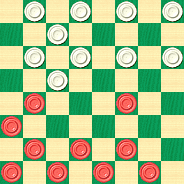
BLACK (Vinnie)
Black to Play and Draw
B:W32,31,30,29,27,24,23,22,21,19:B16,14,12,8,7,6,4,3,2,1.
A---A weak move which very likely loses. 7-10 or 6-10 would have been best.
B---22-18 preserves the probable win.
Can you match steps with Vinnie and find the draw, or will the rhythm elude you? We'll warn you up front that the path to a draw is a long one. Take a whirl with it and then dance your mouse over to Read More to see the solution and the conclusion to our story.![]()
Brush Stroke

Once before, we thought we had run out of plays on the word "stroke" but the Checker Maven staff managed to come through. This week, they've done it again, although warning that it would probably be the last acceptable instance of "stroke" wordplay.
We're not at all sure that we would cover our office walls with the color selected by the woman in the photo above, but you get the idea, and for all we know, she might be an expert checker player in addition to modeling brush strokes.
Today's stroke problem is indeed no brush-over; it's complex and requires the best in visualization skills.
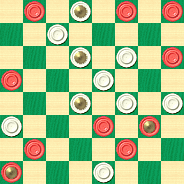
WHITE
White to Play and Win
W:WK2,6,K10,11,15,K18,19,20,21,31:B1,3,4,12,13,23,K24,25,27,K29.
Don't paint yourself into a corner, and after a good brush with this problem, click on Read More to see the solution.![]()
The Checker Maven is produced at editorial offices in Honolulu, Hawai`i, as a completely non-commercial public service from which no income is obtained or sought. Original material is Copyright © 2004-2026 Avi Gobbler Publishing. Other material is public domain, AI generated, as attributed, or licensed under CC1, CC2, CC3 or CC4. Information presented on this site is offered as-is, at no cost, and bears no express or implied warranty as to accuracy or usability. You agree that you use such information entirely at your own risk. No liabilities of any kind under any legal theory whatsoever are accepted. The Checker Maven is dedicated to the memory of Mr. Bob Newell, Sr.

